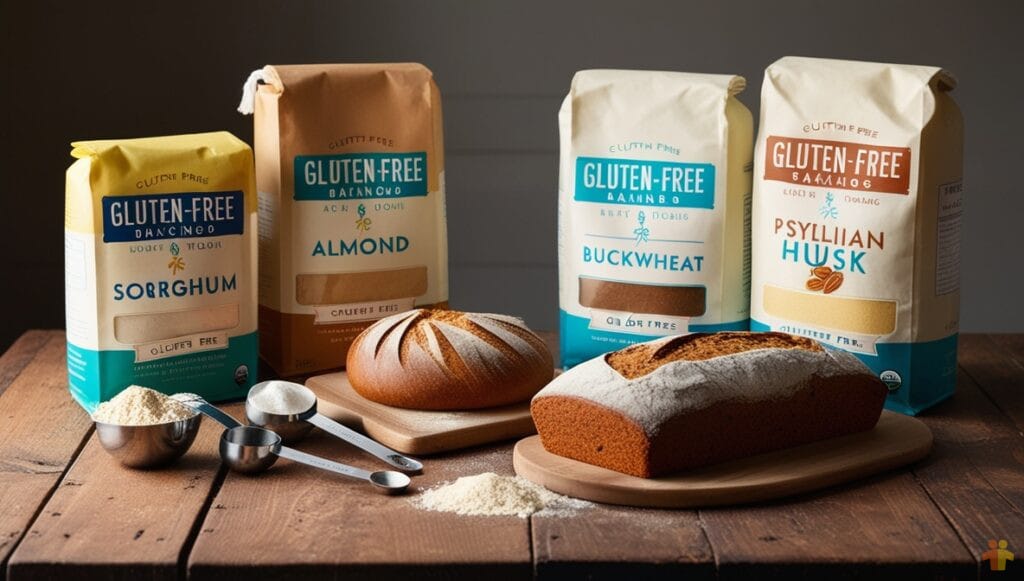The gluten-free diet has become a path many are choosing in recent years, not just for physical health but as part of a deeper journey toward well-being. By eliminating gluten—a protein found in wheat, barley, and rye—this way of eating is essential for individuals with celiac disease or non-celiac gluten sensitivity (NCGS), offering them the relief and balance their bodies need. Yet, beyond medical necessity, many others are drawn to a gluten-free lifestyle for personal health, weight management, or as part of a broader quest for wellness, inspired by both physical and spiritual alignment.
In this guide, we’ll gently explore the essence of the gluten-free diet, unlocking its layers to reveal not only its nutritional foundation but also its potential to influence areas like weight loss, gut health, and even mental clarity. We’ll delve into its ripple effects on the body and mind, the industry’s role in shaping this movement, and the lifestyle shifts it invites. Along the way, we’ll address the debates surrounding its effectiveness with openness and insight, offering a space for reflection.
If you are considering walking this path, whether for medical reasons or personal growth—know that this journey is an opportunity to nurture your health while deepening your connection to what nourishes you on multiple levels. Let this guide be a gentle companion as you explore the potential of living gluten-free, offering clarity, understanding, and support along the way.
Understanding Gluten-Free Diet
A gluten-free diet involves avoiding any foods or ingredients that contain gluten. This includes wheat-based products such as bread, pasta, cereals, and baked goods. Some sources of hidden gluten include soups, sauces, processed meats containing fillers or breadcrumbs, and even certain medications and supplements.
Before adopting a gluten-free diet, it is essential to understand the reasons behind it. Celiac disease is an autoimmune disorder triggered by the consumption of gluten, leading to damage in the small intestine and difficulty absorbing nutrients. NCGS is a condition where individuals experience symptoms similar to celiac disease but without any intestinal damage. These two conditions require strict adherence to a gluten-free diet for optimal health.
For individuals with celiac disease, foods containing less than 20 ppm of gluten are often considered gluten-free by doctors and experts. This standard ensures safe options for people following a strict gluten-free diet.
However, some people may choose a gluten-free diet for personal preference or weight management goals. It is important to consider whether this diet is appropriate and necessary for their individual needs before making any changes to their dietary habits.
Improved Gut Health and Beyond
The gut plays a crucial role in our overall health, from aiding digestion to influencing our immune system. Studies have shown that individuals with celiac disease and NCGS often experience an imbalance in their gut microbiome, which can lead to inflammation, digestive issues, and other health concerns.
By following a strict gluten-free diet, those with celiac disease and NCGS can find relief from these symptoms and improve their gut health. Additionally, some research suggests that reducing gluten intake may also benefit individuals without diagnosed gluten-related conditions by improving overall digestion and reducing inflammation in the body.
Moreover, for those with autoimmune conditions such as Hashimoto’s thyroiditis or rheumatoid arthritis, there is evidence that a gluten-free diet may also help reduce symptoms and improve overall well-being.
Essential Nutritional Factors for a Healthy Diet
While gluten-containing foods offer essential nutrients, embracing a gluten-free lifestyle does not mean sacrificing nourishment. It’s a journey of intention and balance, inviting you to mindfully choose foods that nurture your body and spirit. With thoughtful planning, a gluten-free diet can be abundant in the nutrients your body craves, offering an opportunity to explore new sources of vitality.
Wheat, barley, and rye are examples of whole grains that have long been recognized as rich sources of fiber, B vitamins, iron, and other essential micronutrients. On a gluten-free path, consider the beauty of alternative foods like quinoa, brown rice, beans, nuts, seeds, and fortified gluten-free products. These gifts from the earth can help replenish and sustain your energy, fostering both strength and harmony within.
The modern world also offers a helping hand, as many gluten-free products are now thoughtfully fortified with essential nutrients to bridge any gaps. Yet, as with all choices, awareness is key. Some processed alternatives may be less nourishing, filled with added sugars, or unhealthy fats that do not serve your greater well-being. By focusing on whole, natural foods, you align with a more balanced and vibrant state of health.
This path is not just about what you remove but about what you invite into your life—a deeper connection with the foods that sustain you, a renewed appreciation for mindful eating, and the reassurance that your body can thrive in harmony with this conscious choice. Trust in your ability to create a diet that supports both your physical needs and the energy that fuels your journey.

Gluten-Free Diet and Weight Management
The connection between weight and a gluten-free diet is not straightforward and can vary from person to person. Many people wonder, “Does going gluten-free help with weight loss?” For some, eliminating gluten-containing foods, which often include highly processed carbohydrates, may lead to weight loss.
However, it’s important to note that others may gain weight on a gluten-free diet. This is often due to the higher calorie content in many gluten-free products, especially when these foods replace whole-grain options without portion control.
The long-term effects of a gluten-free diet on weight management are still unclear. While current research continues to explore the relationship between gluten-free eating and weight, it’s essential to focus on maintaining a balanced, sustainable approach to health. To achieve a healthy weight on a gluten-free diet, prioritize whole, nutrient-dense foods and monitor portion sizes.
Whether you’re considering a gluten-free lifestyle for health reasons or weight management, the key is to stay informed, listen to your body, and make thoughtful choices. As more insights emerge, they can help guide us toward a healthier, balanced way of living.
Mental Health and Emotional Well-Being
A gluten-free diet, while often associated with physical health, can also positively impact mental and emotional well-being. Research has shown that individuals with celiac disease or non-celiac gluten sensitivity (NCGS) may experience improved mood and reduced anxiety when adhering to a strict gluten-free lifestyle. Symptoms like brain fog, commonly linked to these conditions, may also diminish with the elimination of gluten.
Beyond these physical benefits, many who embrace a gluten-free lifestyle report feeling more connected to their bodies and experiencing increased energy levels. This heightened sense of well-being often encourages healthier habits, such as engaging in regular exercise or incorporating stress-management techniques like meditation and yoga.
Adopting a gluten-free lifestyle can also provide a sense of belonging and support through online communities, social media groups, and local meet-ups. For those navigating the challenges of living gluten-free in a gluten-filled world, these connections can be invaluable.
While a gluten-free diet may complement mental and emotional wellness, it’s important to remember that it is not a substitute for professional treatment of mental health conditions. However, it can serve as a meaningful addition to a holistic approach to overall well-being.
Gluten-Free Products in the Food Industry – Trends & Insights
The rise of gluten-free products has reshaped the food industry, offering an abundance of choices in supermarkets, restaurants, and online stores. Improvements in the quality of gluten-free products, with a focus on whole, natural ingredients, have also led to greater accessibility for those with celiac disease or NCGS. This allows individuals to maintain a gluten-free lifestyle with ease, without sacrificing taste or variety.
The demand for gluten-free products has also sparked innovation in the food industry, leading to new and exciting options that cater to a wide range of dietary needs. From cauliflower pizza crusts and chickpea pasta to plant-based protein bars and dairy-free ice cream, there are now more diverse and delicious choices available than ever before.
This shift reflects a deeper collective awareness of health and well-being. Yet, as with all things, discernment is key. Not all gluten-free foods nourish the body as they should. Many processed options, though convenient, are filled with added sugars, unhealthy fats, and artificial ingredients that diminish their true potential to support your health.
For those walking the path of a gluten-free lifestyle, it’s important to pause and read labels with intention, seeking out foods that honor your body. Whole, naturally gluten-free options like vibrant fruits, nutrient-rich vegetables, and ancient grains such as quinoa, rice, corn, and Buckwheat offer a more wholesome, harmonious form of nourishment. These choices guide you toward a balanced and vibrant state of being, free from unnecessary additives.
As the gluten-free market continues to expand, let your selections be mindful and intentional. Prioritize foods that resonate with your body’s natural rhythms, focusing on nutrient-dense, whole options over processed alternatives. By doing so, you not only honor your health but also ensure that your choices are both meaningful and aligned with your well-being.
Importance of Industry Standards and Product Labeling
As the demand for gluten-free products increases, so does the availability of these products in the market. However, with this growth comes the responsibility of manufacturers to ensure safe and accurate labeling of their products.
Unfortunately, there is still a lack of consistency in labeling regulations globally. While some countries have strict standards for labeling “gluten-free,” others allow varying levels of gluten content in products labeled as such. This can make it difficult for individuals with celiac disease or NCGS to trust and select suitable options.
To address this issue, many organizations are pushing for stricter regulations on gluten-free labeling, including the use of standardized gluten testing methods and clear disclaimers on any possible cross-contamination.

Personalized Nutrition and Community Support
Ultimately, the decision to adopt a gluten-free diet should be made based on individual needs, preferences, and health goals. While it may offer various benefits for some individuals, it is not a one-size-fits-all solution for all. A personalized approach to nutrition is key when considering any dietary changes.
Moreover, having access to education and community support can make a significant difference in successfully navigating a gluten-free lifestyle. There are now many resources available online and in-person that guide label reading, meal planning, and navigating social situations while following a gluten-free diet.
Ongoing Research Efforts
As the understanding of gluten’s impact on health continues to evolve, ongoing research efforts are crucial in shedding light on this complex topic. This includes exploring potential connections between gluten and conditions such as obesity, diabetes, and autoimmune diseases.
In addition, researchers are also examining the efficacy of various dietary interventions for individuals with celiac disease or NCGS. These studies may provide further insight into how a gluten-free diet can potentially support overall health and well-being.
Overall, staying informed about current research findings can empower individuals to make educated decisions about their own health and wellness journey. As we continue to uncover more knowledge about the effects of gluten on our bodies, we can adjust our diets accordingly and strive towards optimal health. So, it is important to stay up-to-date and incorporate new findings into our dietary choices.
The Bottom Line
A Comprehensive Guide to Starting a Gluten-Free Diet
Thinking about going gluten-free? Before starting a gluten-free diet, it’s important to consult a healthcare professional and do your research. For individuals with celiac disease or non-celiac gluten sensitivity (NCGS), following a strict gluten-free diet is essential for maintaining good health.
However, if you don’t have these conditions, adopting a gluten-free lifestyle requires careful consideration. A gluten-free diet can impact your nutritional intake, weight management, gut health, emotional well-being, and even your social life. While it may seem like a simple way to address health concerns, making the transition to gluten-free eating should not be taken lightly.
For optimal health, focus on a balanced and nutrient-dense diet. Whether or not you’re gluten-free, eating whole foods like fruits, vegetables, lean proteins, and gluten-free grains (such as quinoa and rice) is key to supporting your body. Minimize processed gluten-free products, as they can be high in sugar and low in nutrients.
Here’s what you need to know before starting a gluten-free diet:
- Consult a doctor or dietitian: A healthcare professional can help determine if a gluten-free diet is right for you.
- Prioritize whole foods: Focus on natural, nutrient-rich gluten-free options like fresh produce, lean meats, and whole grains.
- Be mindful of nutritional balance: Going gluten-free can impact your intake of essential nutrients, so take steps to maintain a diverse diet.
- Listen to your body: Monitor how your body responds to dietary changes and make adjustments as needed.
Remember, food isn’t just about nutrition—it’s about enjoying life. Whether you’re gluten-free for medical reasons or by choice, finding a balance that works for you is the key to long-term wellness.
By focusing on whole, unprocessed foods and making informed dietary choices, you can support your health while enjoying the benefits of a gluten-free lifestyle. Ready to start your gluten-free journey? Keep learning, stay mindful, and happy eating!
Conclusion
The rise of the gluten-free diet is a reflection of our growing awareness and intention towards health and well-being. By embracing a gluten-free lifestyle, we are taking the first steps towards personalized nutrition – listening to our bodies and making informed choices that support optimal health.
It’s important to remember that each person’s journey is unique, and finding what works best for you may take time, patience, and support from healthcare professionals, family, and friends. With balance, education, and community support, a gluten-free diet can offer not only physical benefits but also emotional fulfillment in taking control of your health. Keep exploring and learning about different ways to nourish your body with wholesome foods that work for you. Remember, food is not just fuel, it’s a source of pleasure and connection. Embrace the journey towards wellness and enjoy the process!


